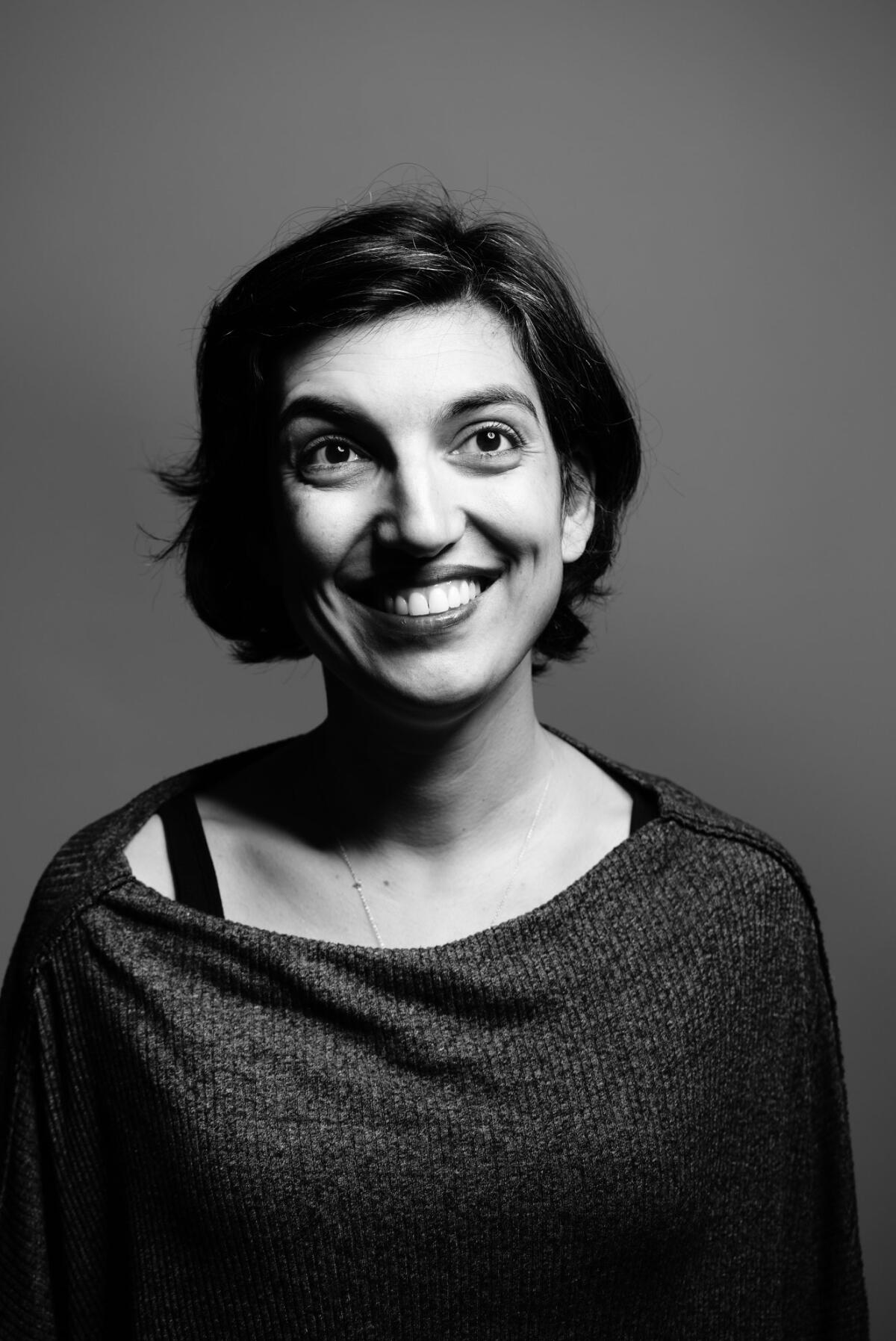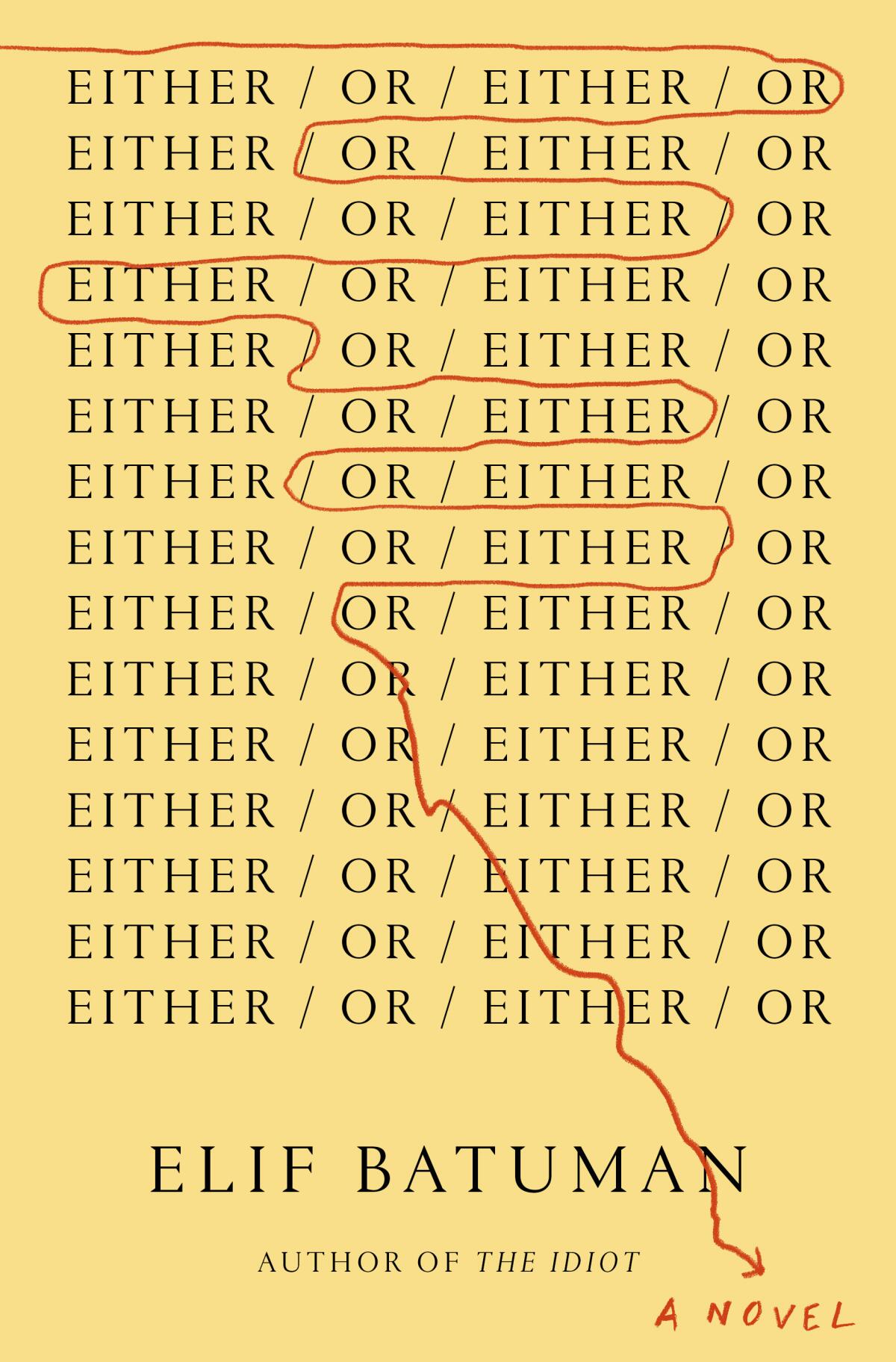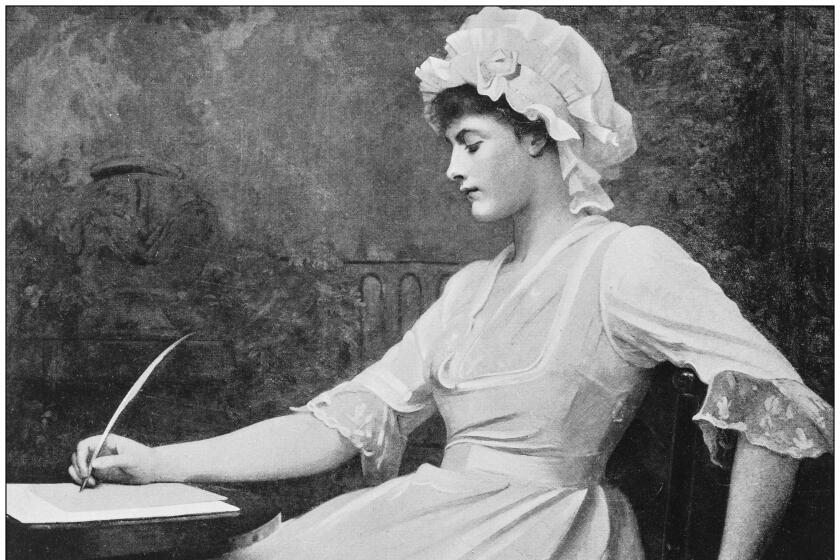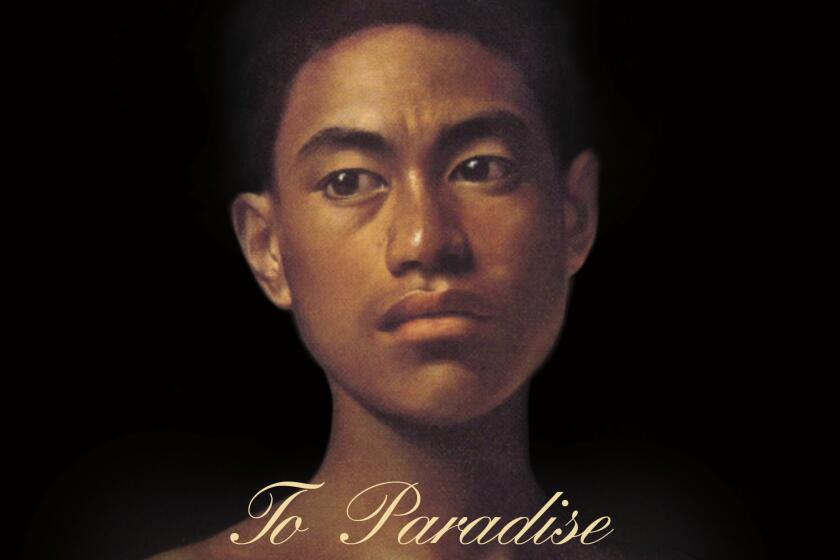Review: Youth’s ecstasy and agony are Elif Batuman’s specialties. But how are the novels?

- Share via
On the Shelf
Either/Or
By Elif Batuman
Penguin Press: 368 pages, $27
If you buy books linked on our site, The Times may earn a commission from Bookshop.org, whose fees support independent bookstores.
Literary sequels are difficult to pull off. I read Elif Batuman’s new novel, “Either/Or,” directly after rereading her 2017 novel, “The Idiot.” That’s 700 pages of the same naive adolescent character, a Harvard student named Selin, offered mostly in sketches without much shape or consequence. It wore me out a bit. The texture of the two is similar: a school year plus a summer, the same brilliant, hapless young woman trying to figure out how to live and make art.
Batuman, a celebrated essayist who has written a book about her obsession with Russian novelists, once said novels should be made up of “all the irrelevant garbage” of life. She has urged contemporary authors to “write long novels, pointless novels. Do not be ashamed to grieve about personal things.”
There’s an audacity here: meandering adolescence as rich, worthwhile subject; an unwillingness to pander to the reader’s longing for plot. There’s also impudence, of which Batuman is, of course, aware: Noting her own (adolescent) frustrations with the depictions of youth in “Swann’s Way,” Selin says, “But why did Proust have to keep thinking about it? Why couldn’t he write a book about something else?”
“Either/Or” starts where “The Idiot” left off: Selin has returned for sophomore year after having gone to Hungary to (sort of) be with Ivan, a man she knows primarily through a long series of emails. She moves into her new dorm and opens her email to find a note from Ivan — but it’s old. She meets his ex-girlfriend, goes to classes. Her mom gets sick. Her friends get boyfriends. She masturbates and has sex for the first time. She gets a job with “Let’s Go Turkey” and confuses everyone in that country by trying to act both Turkish (which she is) and like an absurd American.
With her smart and deliciously comic 2010 debut, the essay collection “The Possessed,” Elif Batuman wrote one of the 21st century’s great love letters to reading.
“The book I work for is for Americans,” she says. “If their life is too easy, they worry that they’re missing the authentic essence of Turkish existence.”
Both novels are charming and made me laugh. I became convinced Batuman is infinitely smarter than I am, got bored sometimes and then was embarrassed by my boredom, certain it was proof of my own dullness, abashed in the knowledge that I speak only one language (Batuman speaks seven) and never finished “War and Peace.”

The year I read Dostoevsky’s “The Idiot” — I was 22 and, much like Selin, I’d decided I wanted to be a writer and was therefore trying to live — I was in Japan. I brought a boy back to my hostel in Okinawa and he found the book under my pillow. “I’m going to write a book called ‘The Ass—,’” he said, laughing and throwing the book down. Also like Selin, I was too young and dumb then to ask him to please go. I was too young to know how.
In contrast with “The Idiot” (Batuman’s, not Dostoevsky’s), there’s a lot of sex in “Either/Or.” Almost none of it is good. It’s acutely, painfully depicted, dissociative in the exact way bad young sex can be (certainly for women). “It went on happening. He told me again to relax. ‘You have to let me,’ he said. I thought about letting him. It got so much more intense that I was sure it must be done, or almost done. This proved not to be the case.”
Also in contrast to “The Idiot” — in which her lack of affect or emotion was often noted — Selin cries a lot in “Either/Or.” There is regular mention of eyes filling and tears falling, yet the narrator continues to float outside, above, so many of the experiences she has. There is no real breakthrough for readers who want to really feel what Selin is going through. This seems consistent, though. All the intelligence in the world is often useless in the face of feeling; often, if one only wants to press into spaces for which they have the proper, exact language, they steer clear of intense feeling, knowing how powerless all that thinking and reading can be in the face of sad.
The “Either/Or” of the title comes from a book of the same name by Søren Kierkegaard. (Selin doesn’t finish it.) As she notes, “Kierkegaard himself had said of Either/Or that you had to either read the whole book or just not read it at all. Kierkegaard was funny!”
Novelist Lynn Steger Strong on the revolutionary passivity of Rachel Cusk, Ottessa Moshfegh and Sally Rooney — how we’ve misread them and what comes next.
The Kierkegaard book posits the arbitrary binary of choosing to live either an ethical or an aesthetic life. Selin chooses the aesthetic. “I had thought that an aesthetic life would be more like a string of adventures than like a coming-of-age novel … but it was impossible to imagine an aesthetic life, or any life, without falling in love. Without love, knowledge itself became a hassle; became bullying and imposition.”
Which brings Selin to a more familiar binary. She wants love but neither marriage nor procreation. Unlike Svetlana, her friend who functions as a foil, and also unlike nearly everyone she meets or reads novels about, she wants a life of art and pleasure as well as agency, absent the usual patriarchal constraints. Her continued inability to feel the world she’s inhabiting enough to find it worthy of literature — and/or to find the literature she reads recognizable enough that it might function as a guide — leaves her continually unmoored.
Through this, the book shows that there is little space for pleasure-seeking or art-making for a girl like Selin; that being free as a young Turkish American woman-artist in 1996 is not so simple as opting out of marriage and motherhood; that plenty of moments of passive violence, self-destruction and abnegation lie in wait. That love or pleasure or a sensible model for living is not so easy to find.
Here’s another detail about that guy in Okinawa: He was at the Army base there. It was 2006, and he was set to be deployed to Iraq the next week. Like every kid I knew from high school who joined the Army, he’d enlisted in exchange for getting minor drug charges dropped. I don’t remember his name or what he looked like. Now when I think about him — how little he knew about what he’d signed up for; how little any of us did — I feel sad.
“Either/Or” lacks shape and impact, but then so does youth. We often fail to register life’s consequences when they come. Or more like: Consequence is sometimes like a mist that slips inside us, creeping and accruing, silent and ineffable at first, until 20 years later we try to write a book (or a review) and realize all the ways that certain bits of time and space have lived and grown and shifted in us since. We realize too that there’s something elemental about that time — when we knew what we didn’t want but hadn’t figured out how to pursue what we might want instead; when we were still dumb enough, regardless of how smart we were, to think that if we just read more, thought more, lived more, one day we might finally understand.
‘To Paradise,’ Yanagihara’s follow-up to the trauma-filled blockbuster ‘A Little Life,’ works hard to addict readers but shirks the hard work of empathy.
Strong is a critic and the author, most recently, of the novel “Want.”
More to Read
Sign up for our Book Club newsletter
Get the latest news, events and more from the Los Angeles Times Book Club, and help us get L.A. reading and talking.
You may occasionally receive promotional content from the Los Angeles Times.








